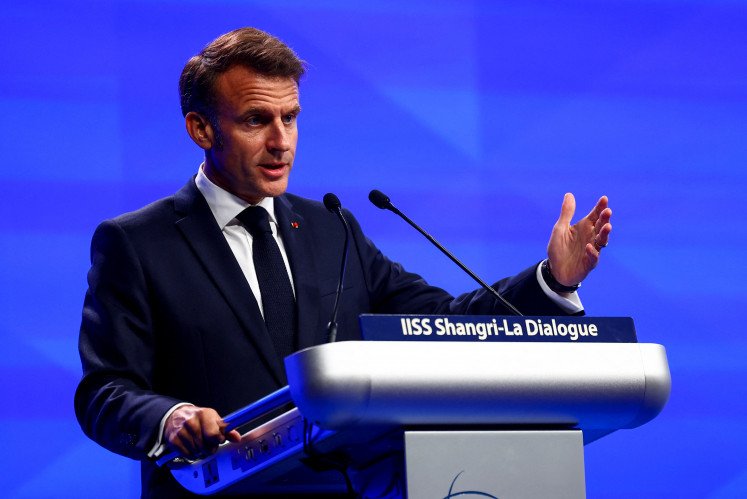Jokowi deepfakes? Fears grow over AI-generated election hoaxes
An artificial intelligence-generated recording of President Joko “Jokowi” Widodo singing “Asmalibrasi,” a song by Semarang-based act Soegi Bornean, went viral in April, fueling concerns of potential proliferation of AI-generated misinformation in the lead up of 2024 general election.
Change text size
Gift Premium Articles
to Anyone

A
ditya Ilyas Saputra, lead guitarist of the band Soegi Borneon, was amused when he heard that President Joko “Jokowi” Widodo had covered the band’s hit single, “Asmalibrasi,” only to learn that it was in fact the work of artificial intelligence (AI).
“I was surprised, thinking that Pak Jokowi was actually singing the song ‘Asmalibrasi’, but it turns out it was produced by AI,” he said as quoted by insertlive.com.
The AI cover of the wildly popular song by Jokowi was uploaded on Twitter on April 28 and drew more than 5 million views, more than 10,000 retweets and more than 37,000 likes. It also went viral on Tik Tok, a popular platform among first-time voters, with more than 188,000 likes and more than 5,000 comments.
Such a fake cover is not unusual in the age of AI, which has been compared to the industrial revolution and thus predicted to change not only industries, but also politics as we know it. While listening to an AI-produced voice of Paul Mccartney covering the Beach Boys’ “God Only Knows” or of Kurt Cobain singing Radiohead’s “Creep” may evoke a strange nostalgia, having an influential politician sing a pop song may in fact stoke fears that the new technology could be used for spreading misinformation.
Dozens of AI covers featuring Jokowi singing popular songs such as Fifty-Fifty’s “Cupid” or JKT48’s “Seventeen” have already been uploaded on YouTube. One Twitter user, @khvfl_, posted a deepfake video swapping the face of Arctic Monkeys' Alex Turner with that of Jokowi, and changing the former’s voice to that of the latter.
What else can AI do in the lead up to the 2024 general election?
@dhamz._ Membalas @fixxx_07 nii bang #aicover #fyp #jokowi #asmalibrasi ♬ ASMALIBRASI _ ALI XD - ZAIN.444 [LM]
‘More accessible’
AI-generated audio and video files have gotten to a point where it is getting harder to distinguish them from the real deal, according to Wisnu Jatmiko, a professor of AI and robotics from the University of Indonesia’s Faculty of Computer Science.
“When it comes to sensitive issues like the election, simple photoshopped images were enough [to create an uproar],” Wisnu said on Monday. “People used to say that video is the most authentic piece of evidence, but it turns out that they now can be faked and this is why deepfakes are concerning,” he told The Jakarta Post.
The underlying technology behind deepfakes used to be limited to big budget film production such as the photorealistic live-action remake of “The Lion King” released in 2019. But current deepfake tools, as reflected by the growing number of deepfake videos featuring Jokowi, are more accessible and user-friendly, with the open-sourced face swapping software DeepFaceLab being free to download and use, Wisnu said.
Divisive polarization in the last two presidential elections was made worse in part by the amount of disinformation that spread online. The Communications and Information Ministry (Kominfo) found 175 instances of hoaxes in January 2019, peaking at 501 instances in April around election day, and disinformation continued to spread until September with the ministry finding 280 instances of hoaxes that month. President Jokowi was then heavily targeted by online hoaxes accusing him of being an ethnic Chinese, a communist and anti-Islam candidate, forcing his militant supporters to up their campaign game in cyberspace.
Misinformation is expected to peak again ahead of the 2024 election. In July last year, a deepfake video showing presidential hopeful Anies Baswedan’s support of an Aksi Cepat Tanggap (ACT) staff member accused of embezzling charity money emerged on social media in an apparent attempt to discredit the former Jakarta governor.
Indonesia is not the only country facing the dangers of AI.
The United States is also set to hold a presidential election in 2024, and AI-generated disinformation has begun to proliferate online as political tension heats up. In April, the US Republican Party responded to President Joe Biden’s campaign announcement by airing a video ad consisting of AI-generated images of a dystopian future if Biden were to win reelection, AFP reports. While Indonesia has yet to face anything as insidious, generative AI has already shown its potential for disinformation.
Regulating AI
Citing the trend of deepfakes in the US, National Resilience Institute (Lemhannas) governor Andi Widjajanto has warned of the potential effect of AI technology on the upcoming general elections. “The government has to be able to create a regulation, or even the technology, to combat [AI-based disinformation]”, Andi told reporters on May 23, Antara reports.
Even if AI-based political disinformation has yet to make its full presence known in Indonesia, NasDem Party politician Willy Aditya admitted that the technology could potentially muddy the landscape even more than during the 2019 general election.
“AI-based disinformation will be quite a challenge, as the type of hoaxes created will be even more advanced than before,” Willy said. “Even if the public is getting better at separating fact from fiction, we have to pay extra attention to hoaxes created by AI.”
Given the current situation, including rumors that the Constitutional Court will rule in favor of returning to the closed-list proportional system for the legislative election, political parties have yet to specifically discuss how to combat AI-based disinformation.
“Once issues revolving around the presidential election are settled, the matter of AI-based disinformation will probably come to the surface,” Willy said. (ahw)









